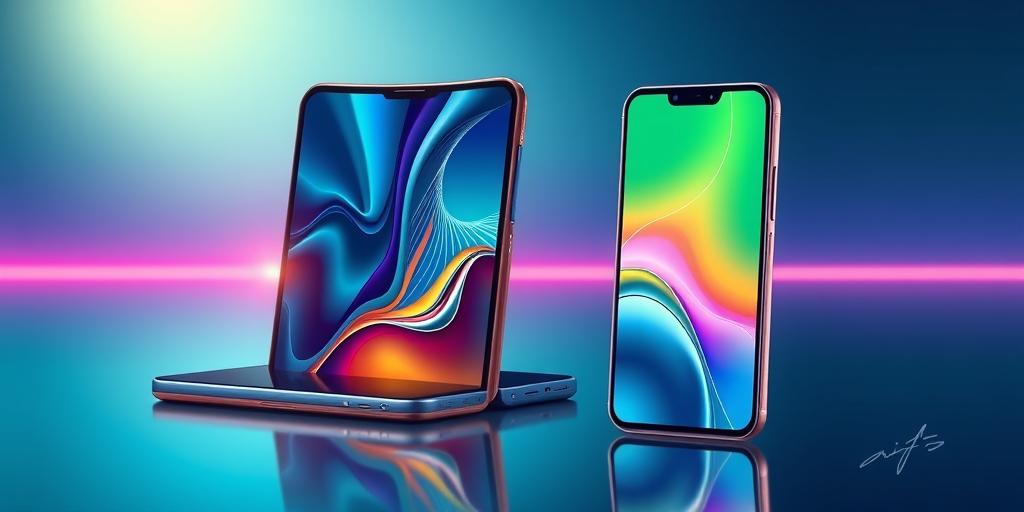The age-old question that has been echoing in the tech world is finally here: Can foldable phones replace traditional smartphones? The answer isn’t as simple as a yes or no. It’s a complex decision influenced by several aspects, from technological advancements to personal preferences and individual needs. In this detailed exploration, we’ll dive deep into the features and capabilities of both foldable and traditional phones to help you decide which one reigns supreme. Prepare to have your mind blown as we unveil the fascinating world of mobile technology and its future trajectory!
Foldable Phones: The Future of Smartphones?
Foldable phones have emerged as the latest and most captivating innovation in the mobile world. Their unique design and functionality have captivated a huge number of users. The ability to unfold into a larger screen provides an immersive viewing experience, perfect for media consumption. In comparison to traditional smartphones, the foldable phone’s larger screen is its ultimate advantage. However, these cutting-edge devices come with a hefty price tag, so you will have to weigh whether the premium price justifies the added features. Whether the benefits outweigh the cost is a personal decision and requires careful consideration.
Enhanced Multimedia Experience
The larger screen size offered by foldable phones dramatically enhances multimedia consumption. Watching movies or playing games becomes a more enjoyable and immersive experience thanks to the increased screen real estate. This significant improvement in screen size elevates the media consumption experience. The larger screen allows for better multitasking and increased efficiency, allowing you to accomplish more in less time.
Durability and Longevity
One area where foldable phones currently lag behind traditional smartphones is their durability. The hinge mechanism, while ingeniously designed, is still susceptible to wear and tear. Another potential drawback is the higher repair costs associated with foldable phones, which can be significantly higher than those of traditional smartphones. When comparing the two options, users must factor in these additional costs.
Traditional Smartphones: Reliable and Affordable
Traditional smartphones remain a reliable and affordable option for most consumers. Their compact size and ease of use have made them a staple in our daily lives, and their affordability makes them more accessible to a wider range of users. Their simplicity and user-friendly design make them an easy-to-use, dependable tool for communication and other everyday tasks. This straightforward design makes them easier to use and reduces the learning curve compared to newer foldable devices.
Cost-Effectiveness
Traditional smartphones are generally more affordable than their foldable counterparts. This price difference is significant and makes them a more accessible choice for budget-conscious consumers. For many, the significant difference in price outweighs the added features of foldable phones. The lower cost makes them an excellent choice for users looking for a functional smartphone without unnecessary features.
Reliability and User-Friendliness
Traditional smartphones have a proven track record of reliability and user-friendliness. Their straightforward design and user-friendly interface are easy to navigate. The tried-and-true technology minimizes the risk of encountering unexpected issues or malfunctions. The simplicity of their design reduces the potential for unexpected problems.
The Verdict: Foldable vs. Traditional
The choice between a foldable phone and a traditional smartphone ultimately depends on your individual needs, budget, and preferences. Foldable phones offer an immersive multimedia experience and enhanced multitasking capabilities, but they come at a premium price and have durability concerns. On the other hand, traditional smartphones offer reliability, affordability, and user-friendliness, making them a great choice for many users. Weigh the pros and cons of each based on your priorities, and you can easily make the decision that works for you.
Finding the Perfect Fit
Before you make a decision, consider how you use your smartphone daily. Do you spend a lot of time watching movies and videos? Do you do a lot of multitasking? If so, a foldable phone might be the better option for you. If you value affordability and reliability above all else, a traditional smartphone might be the better fit. It’s also useful to try out foldable phones and traditional smartphones before you make your final decision.
Ultimately, the best phone for you will depend on your individual needs and preferences. Consider your budget, daily usage, and priorities before committing to either option. Don’t be afraid to try out both types of phones to determine which one best suits your lifestyle.
Ready to dive into the future of smartphones? Let us know your thoughts in the comments below! Which phone type do you prefer and why?




